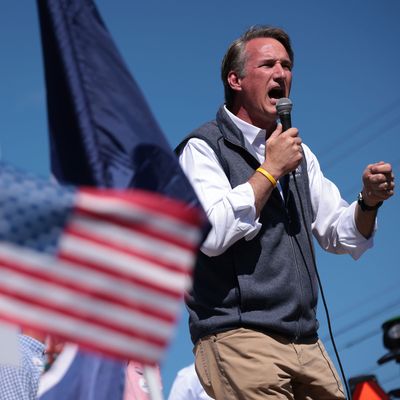
Next month, Virginia’s Republican governor, Glenn Youngkin, will travel to Arizona to hold events for Kari Lake, his party’s nominee for governor. Lake believes, falsely, that the 2020 presidential election was stolen from Donald Trump, that hydroxychloroquine can prevent COVID, and that voting by mail should be banned because it’s a massive fraud. Viewed in the most superficial sense, Lake is an odd alliance for Youngkin, a so-called country-club Republican who beat Trumpier candidates to win his party’s nomination for governor.
Yet Lake hardly represents Youngkin’s only concession to the far right. He headlined a gala for Susan B. Anthony Pro-Life America, which supports a recent Lindsey Graham bill to ban abortions after 15 weeks of pregnancy. His redesigned tour of the governor’s mansion no longer mentions slavery, NPR recently reported. And last week, he proposed a set of education policies that would force transgender students into school facilities and programs that match their sex as assigned at birth, the Washington Post reported. Children wouldn’t be able to change their names and pronouns at school unless their parents submit legal documentation, and even if they do, teachers won’t be required to comply. His policies for schools aren’t yet in effect. Even so, the news could be disastrous for transgender students, who will know perhaps best of anyone that their governor is no temperate business Republican but rather a culture warrior who toys with extremism.
For a while, the governor had people fooled. As the New York Times explained when Youngkin won the GOP’s nomination, he’d staged a careful dance with Trump and the furthest-right corner of his party. To secure the nomination, the Times reported, he “aligned himself with Mr. Trump’s lies about a rigged 2020 election, declaring ‘voter integrity’ a top issue and referring to Dominion voting machines — the subject of conspiracy theories on the far right — as ‘the most important issue’ of the campaign.” Nevertheless, business interests considered him to be more palatable to the Virginia electorate than unapologetically Trumpian candidates like State Senator Amanda Chase. Once he’d advanced to the general election, Youngkin downplayed his anti-abortion stance and played up his business credentials, marketing himself principally as an outsider who couldn’t be bought. He kept Trump himself at a cautious distance, and the Virginia Democratic Party fell for the trap he’d set: They tried, and failed, to link him to the former president. Instead Youngkin benefited from a certain air of mystery. “We don’t know this guy. He could govern like a Larry Hogan, he could govern like a Ted Cruz,” one anonymous Democratic official told the Washington Post after Youngkin won the gubernatorial race.
Youngkin’s dance impressed voters and obscured his true nature. He has more in common with Kari Lake — and with Trump — than he wanted the Virginia electorate to know. Such similarities apply to his social conservatism as well as his early support for the GOP’s election conspiracies. Yet in retrospect, his business interests may have been his first and clearest link with the unpopular former president. Trump, too, depicted himself as an outsider who was wealthy enough to escape influence by special interests. Virginia’s business class fell quickly for him, as the same class once did nationally for Trump. As a candidate, he even hired Stephen Moore, Trump’s former economic adviser, to counsel his own campaign. Now, as governor, Youngkin resembles the ex-president even more strongly. His radicalism, combined with his economic loyalties, make him a familiar figure indeed.
The business Republican as a radical-in-waiting long predates Trump. The story of the Republican Party is frequently one about an alliance between business and socially extremist interests. Before there were MAGA Republicans, there were tea-party Republicans. Before the tea party, there was the Christian right and the John Birch Society and the White Citizens Councils. There was Pat Buchanan, and Barry Goldwater, even the esteemed Ronald Reagan. Members of the business class often have revanchist tendencies, as equality threatens their social, political, and economic power. Wealth is an efficient way to enforce old hierarchies.
Even if Youngkin was a true moderate, his coalition would inevitably pull him to the right. History tells us that in the U.S. at least, an alliance of “respectable” and extremist interests becomes uneven as the latter absorbs the former. What right-wing radicals can lack in public support they make up for with aggression and money: The combination maps out an alternative path to power. A coalition with the far right comes to resemble an appeasement strategy, as moderates and conservatives give cover to other, more extreme figures. By stumping for Lake, Youngkin renews old patterns.
Youngkin reportedly wants to run for president, and if he does, it is likely that his far-right sympathies will become ever more apparent. Moderation offers no path to victory in today’s GOP. Its decades-long turn toward extremism is nearly complete. Youngkin is but a man of his time.






























